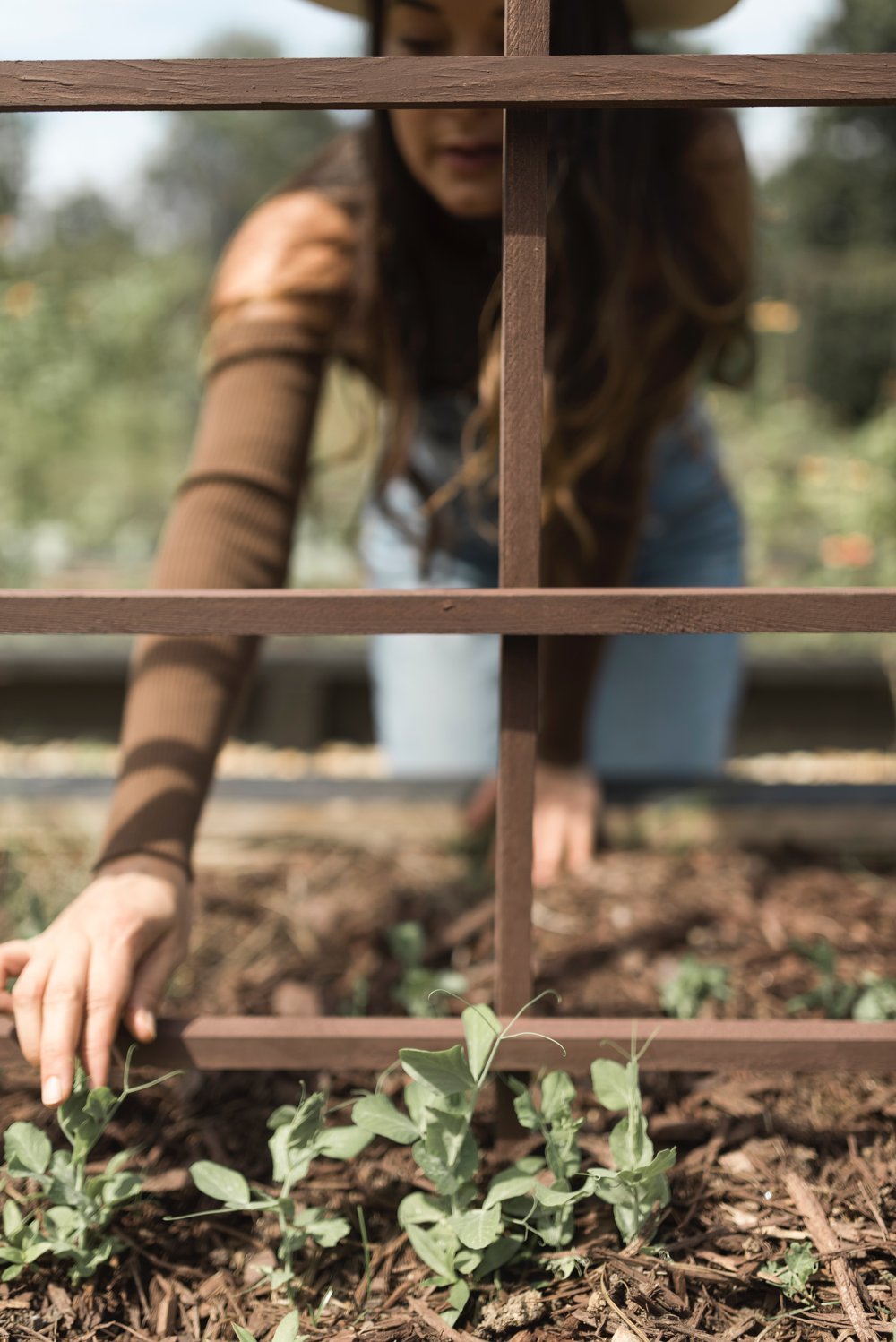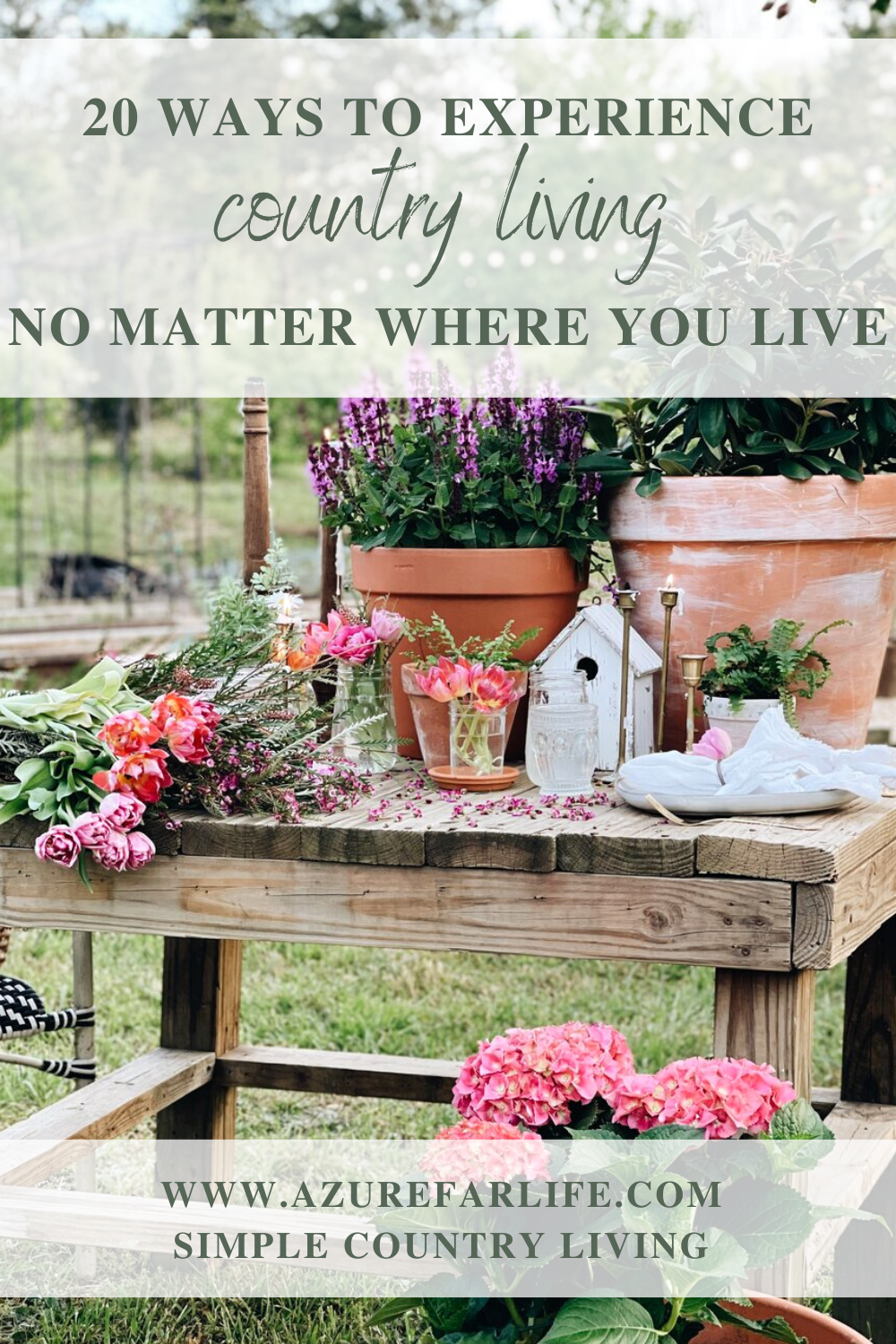20 Ways To Experience Country Living, No Matter Where You Live
So let me tell you a little secret, friend... You do not need extensive land, ten chickens, two donkeys, or rows and rows of veggies to experience simple country living or the "homesteading" life. It is so much more than that (and less)!
You can create your country living or homesteading dream, no matter where you live!
The Truth About Homesteading or Country Living
The term homesteading can often sound scary and nearly impossible to achieve, and this is why I choose to focus on simple country living rather than homesteading. But, in the end, both get down to the same principle, live a simple, sustainable, intentional life. Slowing down to appreciate the smaller things in life.
When you remove the clutter, consume wisely, live intentionally, slow down, and become more independent, you are a homesteader! No matter in which way or where you choose to do it. It can be as simple as growing your own herbs on a windowsill! It will be different for every individual or household.
Did you know? The term "Homesteading" actually comes from the Homestead Act (1862), which offered 160 acres of federal land to US citizens who would live there for at least five years. This is where the concept of being self-sufficient started.
20 Ways to Experience Country Living No Matter Where You Live
I often get asked what one can do to get started when space or resources are scarce. And my answer will always be the same - It starts with a mindset.
Just simple small steps toward a less consumer-driven life are already a great start. It's about creating a lifestyle that goes back to the basics and becoming more self-sufficient.
Don't overthink it ;-) For me, it started with making more meals at home. Then I started a small garden, and it snowballed from there.
Here are 20 simple changes you can make to experience country living or modern homesteading, no matter your current situation.
1. Know your why. What drives you to want to live a slower, self-sufficient life? You will be much more motivated and dedicated if you have a goal or reason.
2. Analyze your current situation and lifestyle.
What does your location allow? Do you only have space for a few potplants, or can you make garden beds? Can you keep a goat or only a few backyard chickens?
What are your needs? Do you want to enjoy garden-to-table recipes? Do you want eggs from chickens? Or perhaps make more DIY gifts and home things?
What time and resources can you dedicate to this new lifestyle? Remember, taking care of animals is a full-time commitment. Who will water your veggies when you are away? Full-on homesteading can become expensive; are you financially strong to take it on?
3. Choose one or two self-sufficient activities you are most interested in and focus on perfecting them. Like baking from scratch, spending more time outside and using less technology, or making compost.
READ: A BEGINNER’S GUIDE ON HOW TO USE COMPOST IN THE GARDEN
READ MORE: 6 WAYS TO BE MORE SELF-SUFFICIENT
4. Learn one skill connected to your chosen activity above and grow from there. I.e., Choose to learn all about growing tomatoes and then add another veggie. Or learn how to do basic sewing and then how to start making your own clothes. Take it one step at a time
5. Reduce your waste and footprint. Compost your kitchen scraps (no meat), grass clippings, old leaves, etc. and reuse it in the garden or donate to someone. Make homemade organic fertilizer that does not negatively impact the soil and ecosystem. Reuse plastic bags or use eco-friendly reusable bags. Switch to natural homemade cleaning products. You catch the drift ;-)
6. Consider alternative energy sources like solar panels and biogas or open fires if you have the space and do it safely.
7. Save water by using gray water in your garden or to wash things like your car. And if you have the means, put up a water tank to catch rainwater.
Now for the fun part - Simple things you can do regardless of your location:
8. Grow vegetables or herbs in containers or on a windowsill.
9. Grow your own sprouts. They make fantastic healthy additions to salads and meals.
READ: THIS POST BY COUNTRY LIFE NATURAL FOODS IS FANTASTIC- WHAT ARE THE BEST SEEDS FOR SPROUTING?
10. Cook and bake from scratch by using vegetables from your garden or getting ingredients from the local farmer's market or store that have been sustainably sourced.
11. Make your own kombucha and kefir to put healthy microbes and probiotics back in your gut. Please research how to do this in the correct, safe manner. This is something many love to do! I have yet to venture into this space.
12. Learn and practice canning, so you need to buy less from the store. This is probably one of my favorite country living activities! Have no vegetable garden? No problem! Buy fresh veggies at the local market, or ask neighbors, friends, and family to gift you any excess produce.
13. Learn to sew or make your own clothing, napkins, curtains, etc.
14. Hang your clothes outside to dry naturally. This has been one of my favorite things to do!
15. Make your own soap and candles. This could be such a fun hobby that you can even monetize.
16. Switch to homemade natural cleaning products for personal hygiene, home cleaning, and clothes detergent.
READ: NATURAL HOMEMADE CLEANING PRODUCTS AND HOW TO USE THEM
17. Make more DIY gifts instead of buying them. It will be way more special and cost-effective.
18. Turn to nature to decorate your home during special holidays. It's amazing what you can find outside to make things pretty!
19. Support local farmers and businesses that grow organically or responsibly source their products.
I LOVE SHOPPING AT COUNTRY LIFE NATURAL FOODS
20. Deliberately choose to slow down to enjoy the small things and take it all in. That might mean watching less TV, riding a bike, going for a walk, or reading a book.
Whatever homesteading or country living means to you, just start. There are no set rules on what homesteading is. It's what you make of it. You are in control of what you eat, how you live your life, and what you enjoy.
But in saying that, be patient and give yourself grace. It does not happen overnight. And if you fail to keep your tomato plants alive or struggle to find quiet time, it is OK. Just keep trying and push through; you will eventually get into the rhythm of the slow life!
Love, Annette xx
PIN FOR LATER









